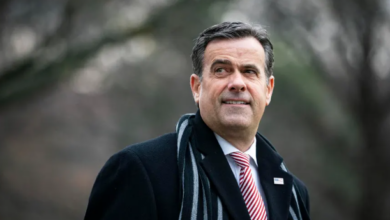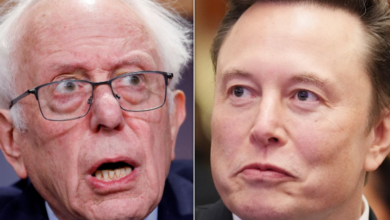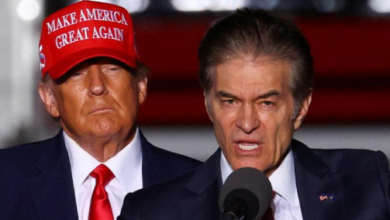Texas’ Deadly Blackouts Could Open The Door For This Democrat To Make History

Texas Democrats are betting they could win their first statewide election in three decades by ousting an entrenched Republican incumbent from a seat on a confusingly named regulatory commission no one has heard of that oversees the oil and gas industry.
The man to pull off what would be a seismic upset is a relatively recent arrival to the Lone Star State, a Rhode Island native who bounced between London, New York City, Washington, D.C., San Francisco and Ethiopia before settling in Austin. Luke Warford wants to become a member of the Texas Railroad Commission — and thereby a sheriff for the state’s storied oil industry.
Slim and bespectacled, with a stylish swoop of wavy hair, the first-time candidate doesn’t exactly look the part. By his own admission, “people look at me and they ask about the Green New Deal and AOC.”
Warford says he’s a pragmatist who wants to see the oil industry thrive — and that it would be madness to reelect a regulator under whose watch the Texas natural gas system collapsed, leaving hundreds to freeze to death and thousands more to foot exorbitant electric bills.
So goes the 33-year-old’s pitch to persuade Texans to put him in charge of policing the state’s most valuable industry in the midst of a global energy crisis.
Ousting the incumbent Republican, Wayne Christian, and electing a Democrat to one of the Texas Railroad Commission’s three seats won’t end Republican control. But Warford promised to bring balance and transparency to a self-dealing panel of partisan regulators and push for common-sense public safety measures at an agency that, contrary to its name, actually oversees the state’s oil and gas drilling and pipelines.
“Hundreds of Texans f**king froze to death in the energy capital of the world. That is unconscionable.”
– Luke Warford
Following a 2011 cold snap, federal regulators warned the Railroad Commission that its 255,000-mile network of natural gas lines was vulnerable to extreme temperatures. The GOP commissioners declined to set any rules requiring pipeline owners to weatherize their infrastructure. Instead of investing in those retrofits, the pipeline companies poured money into the incumbents’ campaign coffers.
Sure enough, when Winter Storm Uri brought freakish arctic temperatures to Texas in February 2021, gas pipelines froze just as badly-insulated homes were demanding more electricity and fuel to stay warm. A BuzzFeed News investigation estimates that at least 700 people — nearly five times the official state death toll — were killed by the storm during the worst week of outages.
“Because of their corruption, these elected officials — my opponent — ignored the warnings and hundreds of Texans fucking froze to death in the energy capital of the world,” Warford said during an hour-long interview this month. “That is unconscionable.”
A ‘Corrupt’ Incumbent
Wayne Christian’s long track record offers easy fodder to vilify the incumbent. A Grammy-nominated gospel singer who first won a state legislative seat in 1998, Christian quietly voted in 2009 to give his own beach house an exemption from a state law banning construction on public shorelines.
Earlier this year, Christian went against the Railroad Commission staff’s advice and approved an oil-waste dump mere feet from a vital aquifer. Three days later, the company behind the dump gave Christian a $100,000 campaign donation, the Odessa American first reported.
That may not break any laws, but Houston Chronicle columnist Chris Tomlinson wrote in February that Christian “demonstrated what at best is a profound disregard for ethics, and at worst, engaged in public corruption.”
Christian, who did not respond to emailed questions, dismissed the allegations earlier this year to Texas Monthly as “mudslinging.”
But his six-year tenure on the Railroad Commission proved unpopular enough that three Republicans challenged him for his seat in this year’s primary.
Last month, Sarah Stogner, the Republican candidate who came in second to Christian in May’s primary runoff, endorsed Warford.
“I’m a lifelong Republican,” Stogner said in an ad she cut with Warford, noting that she was crossing party lines “because our energy industry is too important to let corrupt politicians like Wayne Christian stay in office.”
In a statewide survey by the Democratic pollster Data for Progress in August, roughly 85% of 636 likely voters said they didn’t know enough about Christian or Warford to decide which candidate they favored.
After those surveyed read the candidates’ biographies and saw negative and positive messaging on both, Christian came out just two points ahead of Warford, suggesting it could be a tight race if the Democrat reaches enough voters.
Donors are excited about Warford, who outraised Christian 3–1 in the final few months of the race and has nearly twice as much cash on hand.
An ‘Uphill Battle,’ Even With The Winter Storm Tailwinds
But a six-figure war chest can only do so much in a nation-sized state when you’re an unknown candidate running for an unknown office against an unknown incumbent whose unknown scandals are relatively complex.
“It’s an uphill battle,” said Brandon Rottinghaus, a political science professor at the University of Houston. “Every Texas Democrat is facing strong headwinds in a bad year for Democrats across the country.”
Deadly as they were, the power outages took place 20 months ago, before the economy sank into greater chaos, nuclear war became a serious threat again, and a gunman massacred Texas schoolchildren.
“The grid is a resonant issue, but getting attention to the issue, which many Texans consider solved, is a challenge,” Rottinghaus said. “What’s more, getting attention to the issue for a candidate who is not well known and to an office that is obscure to most voters.”
Warford cultivated 18,000 followers on TikTok with videos teasing Christian for refusing to debate him and riding around on Texas’ little-used passenger railway. In recent weeks, he went on a tour of colleges, hoping to turn out young voters who often sit out midterm elections when a Democrat is president.
They might take to some of Warford’s flashier rhetoric, which includes shirts and hats that read “UNF*CK THE GRID.” Among his most concrete policy platforms is a pledge to “establish a clear weatherization standard, identify critical gas producers, and ensure preparations for the next winter storm are actually completed.” He supports renewables as part of a broad portfolio of energy sectors in the state. While he promises to fight to reduce how much flaring— the polluting practice of burning off excess gas in oil fields — the Railroad Commission allows, he’s certainly not pitching himself as a reflexive foe of the oil industry.
“’Leave it in the ground’ is not a realistic option right now. This is a thing I think Democrats get wrong a lot. Even the most aggressive transitions to net zero have continued oil and gas use for a long time.”
– Warford
At a moment when climate advocates are vandalizing prized works of art to protest any new oil and gas production, Warford’s self-described pragmatism might clash with the ideals of some campus activist types.
“‘Leave it in the ground’ is not a realistic option right now,” he said. “This is a thing I think Democrats get wrong a lot. Even the most aggressive transitions to net zero have continued oil and gas use for a long time.”
A clearer path to victory cuts through the deep-red, rural counties where uncapped oil wells contaminate well water and pose a routine risk of exploding, said Colin Strother, a moderate Democratic strategist in Texas who is not working on Warford’s campaign. The Republicans on the Railroad Commission have refused to take responsibility for wells that never produced any oil or gas, sticking landowners with pollution and costly cleanup.
“He should probably get the list of the top 20 counties with the most uncapped oil wells, and he should probably go to all those counties and say, ‘elect me and I’ll cap these next year,’” Strother said. “You take somewhere like Gregg County, which has some of the most uncapped oil wells in Texas. It’s a solidly Republican county. But they’re very much affected by that issue.”

Having run against Christian as a 20-something rookie candidate for the statehouse in 1998, Strother warned that the Republican was a formidable opponent with allies who would likely tap deep financial resources if Warford became a serious threat.
“Wayne Christian is a political animal. He’s a right-wing evangelical Christian. This guy was tea party before it was cool,” Strother said. “He holds a very, very powerful position as it relates to the oil and gas industry in Texas, he does whatever they tell him to do, and therefore, they’re going to make sure he has whatever funding he needs to compete.”
But Chrysta Castañeda, a former Exxon Mobil Corp. lawyer and 2020 Democratic nominee for the Railroad Commission who lost with 44% of the vote, said Warford’s fate is tied to those of other Democrats running this cycle.
“If Luke outperforms, then several statewide will outperform and it’ll be a very good day for Democrats,” said Castañeda, who recently published a book on oil tycoon T. Boone Pickens. “What’s really going to move the needle in Texas for statewide races is a committed investment by our party structure to persuade people outside the core constituencies that Democrats already have.”
Not Exactly A Green New Dealer
Warford, for his part, thinks he can win over industry stalwarts by presenting himself as a modernizer capable of securing Texas oil’s place in the 21st century.
After graduating from the University of Delaware and heading to England to complete a master’s degree at the London School of Economics, Warford joined the globe-trotting consultant set, working for the World Bank, the African Union, Airbnb, Spotify, and, he said, a handful of oil, gas and renewable energy companies.
A few weeks ago, Warford said, he visited Pioneer Energy Services in Irving, Texas, and was struck by the massive control room where the drilling company runs its operations remotely.
“It’s a technology company that’s taking oil and gas out of the ground; it’s not an oil and gas company,” Warford said. “The thing I usually lean into here in these discussions is that I’m very much of the technology generation, and technology — artificial intelligence, machine learning — it’s going to play a massive role in the future of the energy industry.”
Regulators are always “trailing behind the industry by 20 or 30 years,” he added, noting that “there’s a huge cost there to progress and innovation and to economic growth.”

Sayed Sheasha via Reuters
In October 2020, the French government stepped in to delay a $7 billion deal to import liquefied natural gas from Texas to Europe because the Trump administration’s regulatory rollbacks had increased the drillers’ pollution footprint. While the Europeans might be less picky now as Russia cuts off gas exports to Ukraine’s allies, Warford said the episode showed that, under normal conditions, Texas producers’ freedom from any meaningful regulation was actually a liability.
Warford also thinks he can help the Texas energy companies win a major share of growing global markets for carbon capture technology and clean-burning hydrogen fuel. While electrons from a solar panel or nuclear reactor can replace fuel in electric vehicles or induction stovetops, many parts of the economy still need energy in molecules that burn hot like gas or oil.
Fossil fuel producers like Qatar, the United Arab Emirates and the Netherlands have invested heavily in producing low-carbon fuels such as hydrogen, which produces no carbon dioxide when ignited. While most hydrogen on the market today is made using gas or coal, machines called electrolysers can split the world’s most abundant element from its paired oxygen atom in water to make H2. If those electrolysers are powered with solar, wind or nuclear energy, then the hydrogen produced is more or less carbon-free.
“Getting ahead of the curve would be great, so when this market materializes … we already have the processes in place to take advantage of it,” said Joshua Rhodes, an energy research scientist at the University of Texas at Austin. “Right now, it doesn’t seem like the Railroad Commission is that interested in hydrogen, so that can create regulatory uncertainty, which can drive up the cost.”
Even on carbon capture and storage — the as-yet-unscaled technology oil and gas companies say will allow them to filter planet-heating pollution from their smokestacks — Texas is behind other major fossil-fuel-producing states. Permitting wells to inject captured CO2 for permanent storage takes years. While states such as North Dakota and Wyoming already won approval from the U.S. Environmental Protection Agency to carry out their own permitting without additional federal oversight, Texas only started seriously pushing its application for regulatory “primacy” earlier this year.
“I’m running against a mid-70s career politician who thinks it’s still 1980, and who used the grid failure as an opportunity to advance his political allies and criticize renewables. He’s anti-technology and anti-growth and anti-progress,” Warford said. “That tends to resonate with people.”
“Texans take care of each other and look out for each other, and our elected officials were doing the exact opposite in our time of crisis.”
– Warford
Warford came to Texas seeking some stability. Near the end of his jet-setting 20s, both of his parents died. Hoping to settle down, he followed friends to Austin and fell in love with a fifth-generation Texan. He wants to raise kids with her.
But February last year was a wake-up call. They lost power for three days, and the temperature inside their Austin apartment fell to 38 degrees Fahrenheit. They ran out of food and had no running water. Yet they spent the storm driving around in Warford’s all-wheel-drive vehicle, trying to deliver food to those in more dire straits.
“Texans take care of each other and look out for each other, and our elected officials were doing the exact opposite in our time of crisis. That’s the thing that pissed me off so much,” Warford said.
“I know what it’s like to lose someone unnecessarily and to be robbed of good years with people, and you have all these people grieving unnecessary losses,” he said. “The decision to run wasn’t too much more complicated than, do I want to spend the next year of my life prosecuting this case of the absolutely egregious, fucked-up corruption and failure?”
[ad_2]
Source link





